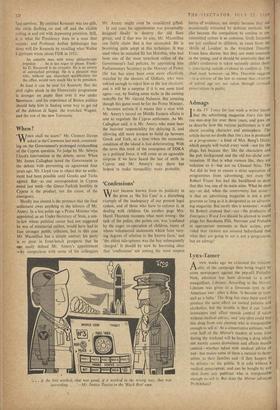`Confessions'
WHAT became known from its publicity in the press as 'the Iris Case' is a disturbing example of the inadequacy of our present legal system, and of those who have to enforce it, in dealing with children. On another page Mrs. Hazel Thurston recounts what went wrong: the task of the police, she points out, was 'confused by the eager co-operation of children, many of whom volunteered statements which bore vary- ing degrees of relation to the known facts,' and 'the ablest tale-spinner was the boy subsequently charged.' It should by now be becoming clear that 'confessions' are among, the most suspect forms of evidence; not simply because they are occasionally extracted by dubious methods, but also becauSe the compulsion to confess to un- committed crimes is so common. Guilt fantasies are not confined to children, as cases from the 'devils of Loudun' to the wretched Timothy Evans have shown; 'but they are most common in the young, and it should be axiomatic that no child's confession is taken seriously unless there i. convincing outside evidence to confirm ,it. The chief need, however—as Mrs. Thurston suggest —is a reform of the law to ensure that childror of school age arc not taken through criminal prosecutions in public.






















































 Previous page
Previous page